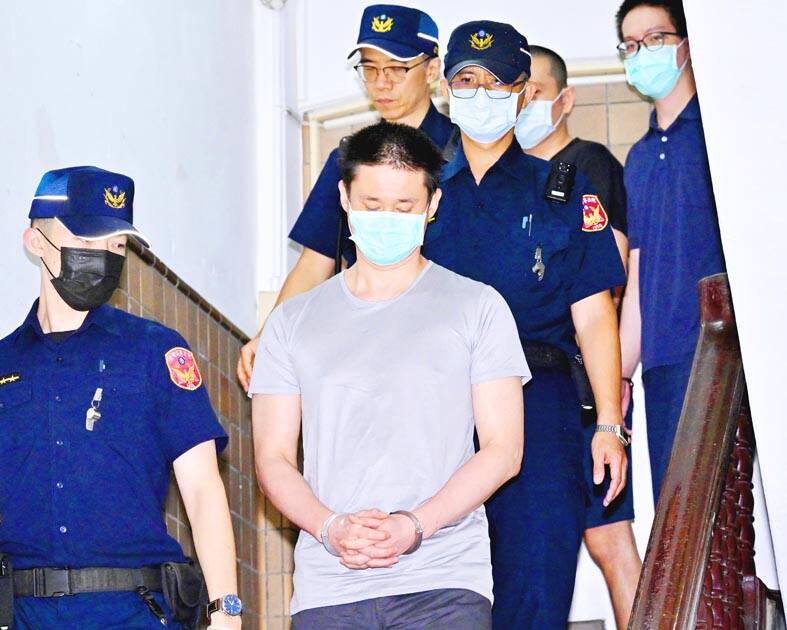The High Court yesterday convicted eight current and retired military officers for developing a spy network for China, including a failed plot to fly a CH-47 Chinook attack helicopter to a Chinese aircraft carrier in the Taiwan Strait.
The defendants received sentences ranging from 18 months to 13 years for contravening the National Security Act (國家安全法), the Criminal Code of the Armed Forces (陸海空軍刑法) and taking bribes.
The defendants were with key military sites, including the 601st Brigade of Aviation and Special Forces Command and the Huadong Defense Command.

Photo: Tu Chien-jung, Taipei Times
The initial investigation was conducted by the High Prosecutors’ Office, which received reports about two Taiwanese businessmen working in China, Chen Yu-hsin (陳裕炘) and Hsieh Ping-cheng (謝秉成), both retired army officers who were recruited by Chinese intelligence officers with promises of financial rewards to form a spy network in Taiwan among their friends and former colleagues in active service.
Beginning in 2021, Chen and Hsieh recruited several officers, including a trio serving at the Aviation and Special Forces Command — Lieutenant Colonel Hsieh Meng-shu (謝孟書), and junior officers Kang Yi-pin (康奕彬) and Ho Hsin-ju (何信儒) — as well as army Major Hsiao Hsiang-yun (蕭翔云) and junior officer Hung Jui-yang (洪睿洋).
Hsiao received NT$620,000 (US$19,396) from Chinese agents, while Kang received NT$700,000 and Ho NT$600,000 for obtaining and handing over classified military material, investigators said.
The Chinese agents sought classified material on troop deployments and Han Kuang drills, investigators said, adding that the most audacious plot was a reward of US$15 million promised to Hsieh Meng-shu, a military helicopter pilot and a special forces wing commander, to defect.
Hsieh Meng-shu agreed to fly a Chinook helicopter using the cover of a military exercise in June last year, they said.
The estimated 15-minute flight was to have ended on the Shandong aircraft carrier on the western side of the Taiwan Strait, they said.
However, a tip-off led to the arrest of Hsieh Meng-shu and his coconspirators before the plan could be carried out, investigators said.
Two junior officers in the spy network, Lu Chun-fang (陸駿方) and Wu Chih-peng (吳志鵬), received money from Chinese agents for filming themselves saying: “In time of war, I agree to surrender to the Chinese People’s Liberation Army,” the prosecutors’ office said.
The High Court judges sentenced Hsiao to 13 years in prison, Hsieh Meng-shu to nine years, Hsieh Ping-cheng and Hung to eight years, Ho to seven years and four months, Kang to seven years and two months and Lu to five years and six months, while an active service soldier surnamed Liu (劉) was handed an 18-month sentence. Wu was found not guilty.
Chen, a retired military officer who was recruited while working in China, could not be located and had likely fled to China, prosecutors said, adding that an arrest bulletin had been issued for him.
The Ministry of National Defense said in a statement that China has targeted Taiwan’s military and personnel for infiltration and espionage, so all units must enhance national security education and training to safeguard information.
All personnel must protect classified material, report suspicious activities promptly and cooperate with officers to prevent infiltration by spies, the ministry added.
Additional reporting by Wu Che-yu

SECURITY: As China is ‘reshaping’ Hong Kong’s population, Taiwan must raise the eligibility threshold for applications from Hong Kongers, Chiu Chui-cheng said When Hong Kong and Macau citizens apply for residency in Taiwan, it would be under a new category that includes a “national security observation period,” Mainland Affairs Council (MAC) Minister Chiu Chui-cheng (邱垂正) said yesterday. President William Lai (賴清德) on March 13 announced 17 strategies to counter China’s aggression toward Taiwan, including incorporating national security considerations into the review process for residency applications from Hong Kong and Macau citizens. The situation in Hong Kong is constantly changing, Chiu said to media yesterday on the sidelines of the Taipei Technology Run hosted by the Taipei Neihu Technology Park Development Association. With

CARROT AND STICK: While unrelenting in its military threats, China attracted nearly 40,000 Taiwanese to over 400 business events last year Nearly 40,000 Taiwanese last year joined industry events in China, such as conferences and trade fairs, supported by the Chinese government, a study showed yesterday, as Beijing ramps up a charm offensive toward Taipei alongside military pressure. China has long taken a carrot-and-stick approach to Taiwan, threatening it with the prospect of military action while reaching out to those it believes are amenable to Beijing’s point of view. Taiwanese security officials are wary of what they see as Beijing’s influence campaigns to sway public opinion after Taipei and Beijing gradually resumed travel links halted by the COVID-19 pandemic, but the scale of

A US Marine Corps regiment equipped with Naval Strike Missiles (NSM) is set to participate in the upcoming Balikatan 25 exercise in the Luzon Strait, marking the system’s first-ever deployment in the Philippines. US and Philippine officials have separately confirmed that the Navy Marine Expeditionary Ship Interdiction System (NMESIS) — the mobile launch platform for the Naval Strike Missile — would take part in the joint exercise. The missiles are being deployed to “a strategic first island chain chokepoint” in the waters between Taiwan proper and the Philippines, US-based Naval News reported. “The Luzon Strait and Bashi Channel represent a critical access

Pope Francis is be laid to rest on Saturday after lying in state for three days in St Peter’s Basilica, where the faithful are expected to flock to pay their respects to history’s first Latin American pontiff. The cardinals met yesterday in the Vatican’s synod hall to chart the next steps before a conclave begins to choose Francis’ successor, as condolences poured in from around the world. According to current norms, the conclave must begin between May 5 and 10. The cardinals set the funeral for Saturday at 10am in St Peter’s Square, to be celebrated by the dean of the College